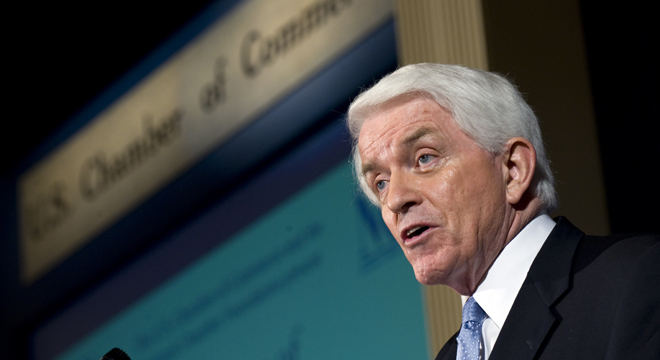Two groups not exactly known for their buddy-buddy relationship, the AFL-CIO and Chamber of Commerce, teamed up on Thursday to release a joint set of principles for immigration reform.
While the most contentious political topic right now and the most painful issue for the GOP is citizenship for the 11 million undocumented workers already in the United States, the talks between business and labor are at least as important to passing a bill — and just as fragile.
The Chamber of Commerce and AFL-CIO are the heaviest of heavyweight interests within the GOP’s and Democrats’ respective coalitions, and senators working on reform are urging them to reach a solution in order to harness their combined lobbying heft. Either of them pulling out makes it that much easier for pro-labor Democrats and pro-business Republicans in Congress to oppose a bill that their constituents might already dislike for any number of unrelated reasons. That’s what happened in 2007, when squabbles between these groups helped kill President Bush’s reform efforts.
So what are the negotiations over? On the labor side, organizers want immigration reform mostly for its provisions legalizing existing undocumented workers, which they hope will make it easier to recruit union members and end labor abuses in industries with a high number of immigrant workers. On the business side, employers in a variety of industries like agriculture, meatpacking, and hotels rely heavily on cheap immigrant labor and want a reform bill to both legalize their workforce and provide a legitimate way for them to bring in more workers in the future.
It’s those future workers who are the sticking point. Labor officials are highly suspicious of complaints from business that they can’t find Americans to do these kinds of tough jobs even if they offer better wages and benefits. And they’re worried that creating a guest worker program to bring in temporary laborers could be a powerful tool to undercut labor organizing. After all, why listen to worker demands when you can just fire them and bring in a new set of employees from abroad instead? Business groups complain that restrictions on their ability to hire immigrant workers will lead to more labor shortages and attract even more illegal immigrants.
The joint principles released Thursday, which both sides stress are nowhere near a detailed final agreement, are the closest the two have come to bridging the gap. Each side gives something up: labor acknowledges that businesses might need to import low-skill workers for some jobs even in a lousy economy with high unemployment. Businesses agree that they should have to look for American workers first. They also agree there should be a federal agency that collects data on immigrants and labor to help determine what the economy actually needs, an important negotiating point for the labor side.
There’s another noteworthy dynamic behind the announcement, though, and it’s one we’ve seen a lot of around Washington since the election. Pretty much everyone involved acknowledges that reform may end up failing to pass this session. But nobody working on a deal wants to be blamed if it things go wrong and have to face the wrath of a large, politically active bloc of Latino voters, consumers, and activists. Republican politicians, whether or not they back a reform bill, tell the press every day that it’s Obama’s fault if a bill fails because he wants to keep Latinos angry at the GOP. Meanwhile, the White House is working on its own bill outside of Congress, partly because in a worst-case scenario they’ll be able to show that Republicans blocked a finished deal containing Latinos’ favored reforms. And it’s no coincidence that the AFL-CIO/Chamber incomplete and vague agreement on principles comes just days after they were forced to deny reports their talks were stalling. If things go wrong, they want citizenship or border issues to take the blame, not indecisiveness on their part.
In other words, this isn’t a legislative fight like Obamacare, where most of its opponents would have been eager to take credit for its failure. Almost no one involved with immigration talks wants to be the face of a failed bill. And as long as everyone stays terrified of being the one holding the bag after a deal collapses, immigration reform has a chance of squeaking through.









